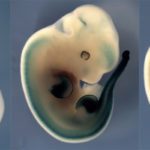Lien vers Pubmed [PMID] – 11944980
Genomics 2002 Apr;79(4):493-8
Mesomelic dysplasia is a severe shortening of forearms and forelegs, and is found in several distinct human syndromes. Here, we report the cloning of the breakpoints of a human t(2;8)(q31;p21) balanced translocation associated with mesomelic dysplasia of the upper limbs, as well as with vertebral defects. We show that this translocation does not disrupt any gene, hence it most likely exerts its deleterious effect by modifying gene regulation. The HOXD complex lies approximately 60 kb from the translocation breakpoint on chromosome 2. This cluster of genes has an important role in the development of both the vertebral column and the limbs. Only a few cases of mutations of these homeotic genes have been described so far in humans. However, gain- and loss-of-function of Hoxd genes in mice can induce mesomelic dysplasia-like phenotypes, suggesting that misexpression of HOXD genes may indeed be at the origin of this hereditary phenotype.

